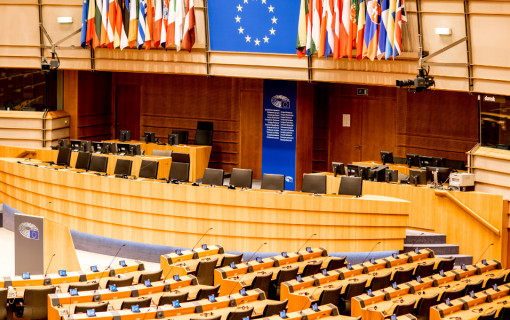Ensuring Electoral Transparency and Integrity in Egypt: the Need for a Permanent, Independent Electoral Management Body
By: Zeinab Abdelkarim, Regional Director, Middle East and North Africa
Moeed Sufi, Program Associate
Egypt’s January 2014 constitutional referendum process faced heavy scrutiny. The much-watched poll took place amid an aggressive crackdown on political dissent following the ouster of President Mohamed Morsi in July 2013. Campaigning was largely in favor of approving a new constitution. The result of the referendum – which saw 98.1 percent voter approval with 38.6 percent voter turnout – was largely expected.
While many analysts focused on the politics of the referendum, less attention was paid to its legal and procedural structure. The delay in finalizing the legal framework, for example, hampered electoral committees’ abilities to conduct the referendum in a manner consistent with international election integrity and transparency standards. The Political Rights Law was amended three times, once on the eve of the call for the referendum, and twice after the call was issued.
Further, amendments issued by decree after the call for the referendum denied election management authorities the opportunity to introduce more stringent measures to guarantee integrity of the vote, or adequate time for planning contingencies and alternative scenarios.
This led nongovernmental organizations (NGOs) observing the elections – including Germany-based Transparency International – to call the effectiveness of Egypt’s ad-hoc electoral committees into question, specifically in their ability to provide adequate oversight. Similarly, a report from Democracy International, a U.S.-based NGO that also observed the referendum, argued that the division of responsibilities among electoral administration bodies placed constraints on administrators’ ability to control and manage the varied referendum processes. When decision making is not centralized in a single body responsible for managing the election, the transparency and integrity of the electoral process may be compromised.
The conclusions of international observers indicate a structural weakness in Egypt’s electoral framework – the absence of an independent, permanent election management body (EMB). An independent EMB can play a stabilizing role as a neutral arbiter of electoral processes when elections are a key element of a post-revolution political transition – as in Egypt. In the medium and long-term, an autonomous EMB enhances electoral integrity by mitigating the risk of governmental and partisan interference, and strengthening impartial election administration. Moreover, an EMB with a mandate covering functions that are critical to free and fair elections can foster trust in the electoral system among various stakeholders, depoliticize election administration through implementing impartial election processes, and regulate the conduct and staffing of the body itself.
The fact that Egypt’s 2014 constitution requires the establishment of such an EMB, which is on par with recommendations of local and international election administration experts, presents a unique opportunity to set up a strong structure to support electoral transparency and integrity in Egypt.
Given the challenges to election integrity and transparency faced by Egypt’s existing election management framework, the creation of a permanent EMB will help Egypt approach elections as long-term cyclical processes that benefit from sustained deliberation, rather than one-time events managed by ad-hoc committees. The resulting long-term systemic management and oversight provided by an independent Egyptian EMB include legal frameworks governing voter registration, candidate eligibility, delimitation of boundaries, ballot design and training polling station personnel and judges. These core tasks will do much to redress recent management gaps that have tested the integrity and transparency of Egypt’s electoral events.
The success of Egypt’s ongoing efforts to abide by international standards on electoral transparency and integrity will depend largely on how it structures and funds the expected EMB, as well as on the breadth of the mandate with which it is tasked. While electoral events are never insulated from the political context in which they take place, an effective independent EMB can help structurally separate partisan politics and institutions with vested interests in election results from its core mandate.
Public deliberation over the creation of an EMB during and after Egypt’s presidential and parliamentary elections will draw much-deserved attention as the nation continues to develop and strengthen its democratic institutions. An investment by Egyptian stakeholders in structuring an EMB capable of tackling Egypt’s electoral transparency and integrity concerns will likely yield a more credible electoral process.









